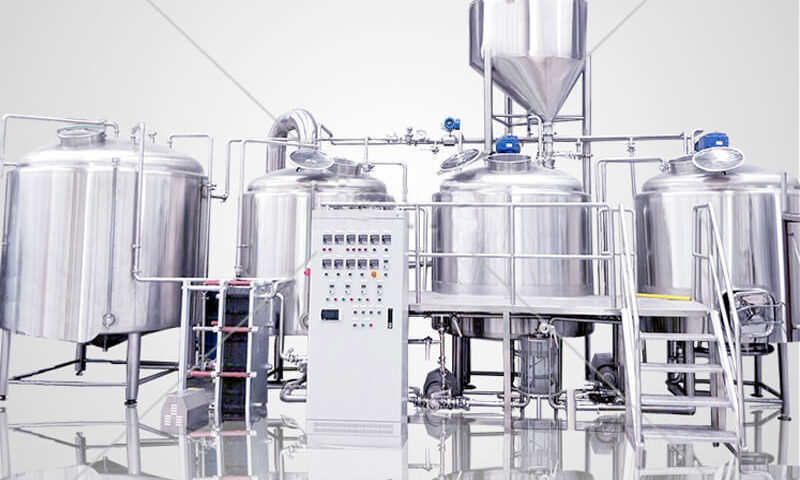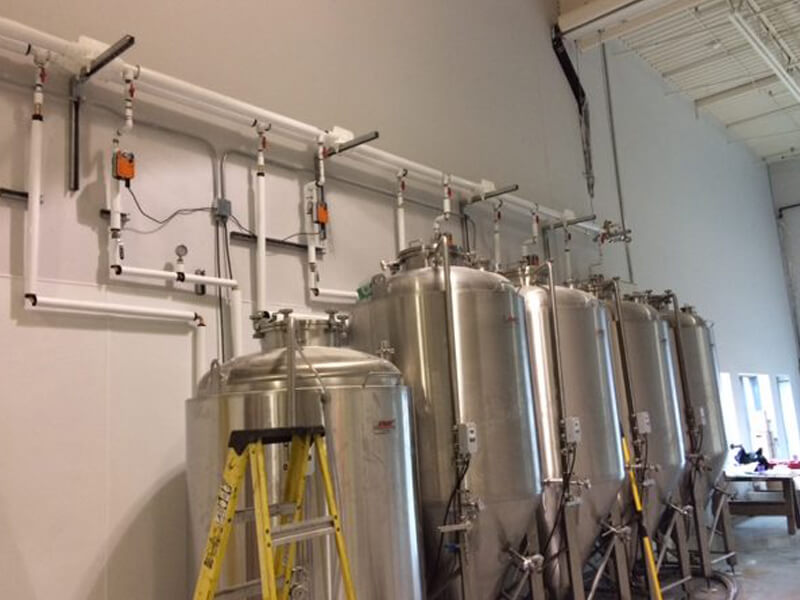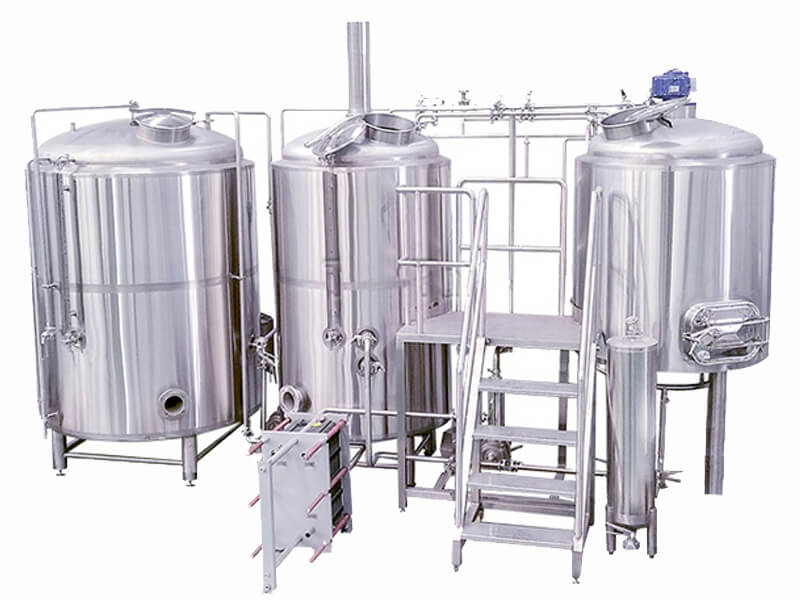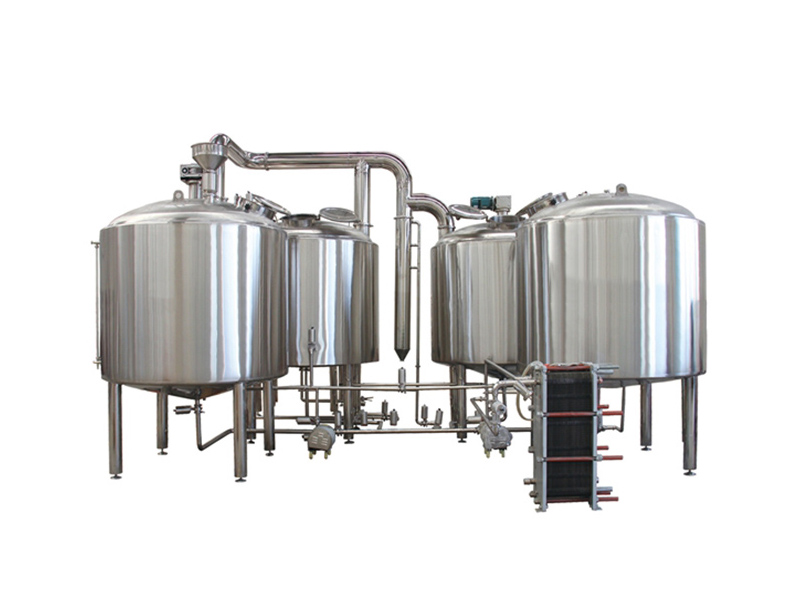
How should the craft beer equipment be cleaned up?
04/09/2020
How can glycol be used in Beer Cooling System
04/11/2020Craft beer is defined as being traditionally produced by small breweries with less than 6 million barrels a year and independently-owned. In the last decade, the number of brewery establishments has sextupled (grown by a factor of six times). In that same time frame, the number of brewery workers has more than doubled. Craft beer production now accounts for 12.7% of the beer market volume in the U.S. Last year (2017), a record breaking $26 billion dollars of craft beer was sold in the U.S. – accounting for nearly a quarter of the $111.4 billion-dollar beer industry sales!
What we are witnessing (and enjoying) is a craft beer revolution.
Quality in every aspect of the operation is essential to the survival and growth of a craft brewery. It’s not just knowing how much lavender to season your next pilsner with, how long your Indian Pale Ale (IPA) needs to ferment, or how many hops are needed to give your chocolate stout its unique smooth taste: it is planning for high-quality operations, distribution logistics, marketing, internal communication, management, and a lot of hard work that help make a brewery thrive.
In this guide to opening a brewery, we’ll give you an overview of what you need to get started, including essential nanobrewery equipment, legal considerations for permitting and zoning, and a suggestions for designing a brewery using unique and green building solutions.
STARTING A NANOBREWERY
Starting your own nanobrewery is work, so don’t jump into it on a whim thinking because you’re producing less than 200 gallons of beer per year, it will be easy or a ‘get-rich-quick scheme’. A love and affinity to great tasting beer is a good place to start, but to be successful, you need to approach it the same as you would any other type of business, because that’s exactly what it is.
Starting a new brewery (of any scale) is a capital-intensive choice that needs to be considered carefully. While you can certainly buy used brewery equipment to save money, opting for home-made solutions or buying the cheapest equipment will likely results in on-going and costly maintenance, not to mention be difficult to expand when your brewery grows and needs to increase production capability.
BREWING PERMITS, LICENSES AND INSURANCE FOR BREWERIES
Nanobreweries typically do not generate enough revenue to make wide-scale distribution profitable. You’ll need to sell the majority of your beer for on-premise consumption or to nearby and local tap rooms. Whether you are legally able to sell beer from your brewery’s location depends on your local and state laws. We recommend seeking the legal counsel of a firm or experienced lawyer in your area to help navigate the licensing and permitting of your brewery.
That having been said, before you fire up the boilers, you’ll need to apply for a federal brewing permit. This is a free application filed with the Alcohol and Tobacco Tax and Trade Bureau (also known as the Tax and Trade Bureau, abbreviated TTB). The TTB application usually takes several months to process. Prior to issuing your brewing permit, the TTB will want you to get a brewer’s bond and verify all your brewery equipment is installed and operational.
A state liquor license, in addition to local licensing, is required if you want to capitalize with strong on-premise and tap room sales by serving beer at your brewery.
If you plan to sell merchandise like hats, shirts, hoodies, mugs, or one-of-a-kind beer steins embellished with your brewery logo, you guessed it – you’ll need a license for that too!
In addition to becoming a tenacious bookkeeper, keeping your permits active and in good standing, as well as successfully running your own brewery business, you should also consider insurance. If you are seeking a business loan or wish to secure finances from a bank to help with the startup costs, you will likely be required to get and show proof of having property, casualty, and liability insurance.
Especially in the early days, one legal misstep can crush all of your beer making efforts, leaving only debt in place of your brewing ambition. Not to sound like a broken record – for this reason, we recommend you seek the expert advice of legal counsel in your area for ensuring you have the proper permits in place before starting a brewery.
LEARN YOUR CRAFT (BEER)
Know how to brew good beer. Gain an in-depth understanding of the brewing process. Just ‘winging it’ will not get the job done. Having friends who say they would buy your beer is a start, but not the foundation to building a successful brewery. While experimentation is key to discovering new tastes, there are time honored principles and methodologies for producing quality beer. Brewing is a science, a craft, and some would even describe brewing as a form of art. Just as a sommelier is expected to have an expert level understanding of wine production, if you are passionate about beer and opening a brewery, you need to devote the time, gain an understanding of how to make beer, and build a similar foundation of knowledge.
If this your first foray into brewing, there are many online resources and books about brewing beer or opening a brewery. We recommend you start there. Another avenue to learning how to make beer and become a professional brewer would be to attend an accredited brewing school. All About Beer Magazine produced a list of brewing schools and beer industry education programs by state.
If you already have a good understanding of the brewing process and making beer, seek out the experienced advice from well-known or successful brewmasters (‘brewmeisters’ in German) for critique. Ask them to be critical of your work. Brutal honesty is hard to come by and can be hard to hear. Critical reviews and critiques from a brew master should be met with humility, respect, and regarded as a learning opportunity so you (and your beer making skills) can improve.
Get your beer recipes down to a science! The phrase ‘brew like a monk’ is most commonly used to describe the processes for producing monastic abbey and Trappist style beers with centuries of history – symbolizing the highest quality in brewing. The phrase is also jargon used to describe head brewers, professional brewers, as well as amateur brewers that consistently produce a great quality beer. These are individuals who know something about brewing and can tell you when calcium carbonate is needed to remove an acrid and bitter aftertaste.
LEARNING FROM YOUR BEER MAKING MISTAKES
Before opening a brewery, know mistakes are going to happen. Learn to deal with them. Look at them as another learning and growing opportunity. Even large breweries (macrobreweries) run into issues and have to quickly overcome obstacles. Knowing how to address and work around them is essential to the business, brand, and maintaining the ability to produce a high-quality beer. For every question that comes up, study or seek the advice of an experienced brewer to learn the answer. Very much like the wine industry, professionals in the beer industry are eager to help each other and will tell you about their good and bad experiences.
When action is needed to correct a mistake – formulate a plan and keep moving forward. Understand and minimize the risks involved, so as not to over-extend or carelessly create a business model that isn’t sustainable or profitable.
START SMALL AND EXPAND YOUR BREWERY
Start small. Word of mouth by those who like your beer will help establish a small community of followers. Branch out and expand your customers by attending farmer’s markets, local, county, or state fairs, arts and craft fairs, sporting events, concerts, and performances.
When attending an outdoor or promotional event, be sure to stand out from the crowd of white pop-up canopies by setting up a custom-made outdoor canopy to attract the attention of potential new customers. Sponsor beer related events in and around your community to get your brewery’s name out there!
Get on social media and let customers know of upcoming releases, seasonal beers, or events! Enter
A bit of (sober) planning, patience, due diligence, and a great deal of tenacity will go far to creating a popular neighborhood watering hole.
ESSENTIAL EQUIPMENT FOR OPENING AND OPERATING A BREWERY
Whether you are brewing your favorite light bodied ale, a crisp lager, or seasonal beer, having the right equipment is essential to opening and operating a brewery. There are many choices when it comes to selecting manufacturers that produce individual pieces of equipment or complete turn-key systems for breweries. We recommend contacting local or nearby companies and discussing your brewery size to better determine the necessary equipment to start or expand your brewery. Local companies will offer a more personalized experience, and should you need support, they are just down the road to get you back up and running quickly!
CONTACT US TODAY TO DISCUSS YOUR BREWERY NEEDS!
Engineered fabric structures from Ruijia offer breweries, owners, and brew masters a sustainable brewery design for faster construction and increasing revenue. Our unique building solutions are used for enhancing, expanding, or renovating brewery facilities and operations.Ruijia building systems have minimal foundation requirements – allowing them to be safely anchored and secured to most ground types. Engineered fabric structures from Ruijia are green building systems for breweries looking to reduce their environmental footprint and create the needed space for turning a passion for great beer into a profitable profession!




